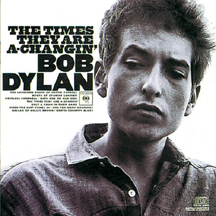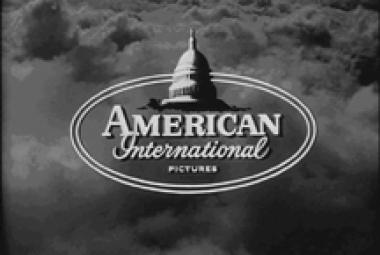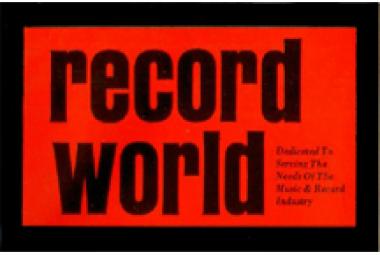The Times They Are a-Changin’ is the third studio album by American singer-songwriter Bob Dylan, released on January 13, 1964 by Columbia Records. Produced by Tom Wilson, it is the singer-songwriter’s first collection to feature only original compositions. The album consists mostly of stark, sparsely arranged ballads concerning issues such as racism, poverty, and social change. The title track is one of Dylan’s most famous; many feel that it captures the spirit of social and political upheaval that characterized the 1960s. Some critics and fans were not quite as taken with the album as a whole, relative to his previous work, for its lack of humor or musical diversity. Still, The Times They Are a-Changin’ peaked at #20 on the US chart, eventually going gold, and belatedly reaching #4 in the UK in 1965. (More from Wikipedia)
“The Ballad of Hollis Brown” is on Dylan’s third album, The Times They Are A-Changin’, and I imagine that this is the album that most people think is his most overtly “protest” album. I beg to differ; Dylan’s breakthrough second album, The Freewheelin’ Bob Dylan includes four songs that are much closer to being protest songs than any of the songs on Times: “Blowin’ in the Wind”, “Masters of War”, “Oxford Town”, and “A Hard Rain’s A-Gonna Fall”. In fact, I would go so far as to say that Bob Dylan is much less of a protest singer than he is generally perceived to be. I speak as someone who is as big a fan of the acoustic Dylan as of the electric Dylan, and I own dozens of songs from this time period that never made it onto any of Bob Dylan’s major-label albums – and there are hardly any protest songs among those recordings either.
On the following album, The Times They Are A-Changin’, the targets are even more diffuse. A careful listen to the title song, “The Times They Are A-Changin’” makes it clear that Bob Dylan is not sending out some clarion call for protest and change, although the tone of the song makes it seem that way. The lyrics are an acknowledgement that the train has already left the station – that the world has irrevocably changed – along with a warning to those who haven’t gotten it yet.
“With God on Our Side” relates a litany of various wars, the Cold War and other historical events – such as the slaughter of Native Americans in the 19th Century and the Holocaust – in the context of the oft-believed notion that God or some other higher power is “with us”. Tellingly, nothing is said about the Vietnam War at all in the song originally, although a verse was added for live performances in the 1980’s. I had never heard that before, and I doubt you had either; here is the added verse: “In the nineteen-sixties came the Vietnam War / Can somebody tell me what we’re fightin’ for? / So many young men died / So many mothers cried / Now I ask the question / Was God on our side?”
“Only a Pawn in Their Game” is about the murder (Wikipedia calls it an “assassination”, and that is not really an overstatement) of civil rights activist Medgar Evers in his own driveway. The conviction of the unrepentant Klansman Byron de la Beckwith for the murder took place in Mississippi in 1994; two other trials of this man 30 years earlier resulted in hung juries. I don’t know how much visibility this murder has in other parts of the country, but it is still pretty fresh in Mississippi. One reason is that Medgar’s widow, Myrlie Evers-Williams is a civil rights activist in her own right – she was on the local news just this month.
This song is unquestionably a protest song, and Bob Dylan performed “Only a Pawn in Their Game” at the 1963 March on Washington for Jobs and Freedom, the same event where Rev. Martin Luther King, Jr. later gave his famous “I Have a Dream” speech. However, the song is really less about Evers and more about the murderer (and the other poor whites in Mississippi in those days). As Wikipedia says it: “The song suggests that Evers’ killer does not bear sole blame for his crime, as he was only a pawn of rich white elites who incensed poor whites against blacks so as to distract them from their position on ‘the caboose of the train’.”
According to Joan Baez (speaking in the documentary No Direction Home), the genesis of “When the Ship Comes In” came from Bob Dylan’s own mistreatment at a hotel when a clerk refused to give him a room. The rousing music and vivid Biblical imagery gives the song’s theme – people rising up against oppressive forces that are mistreating them – an air of inevitability that is in the spirit of the title song on the album, “The Times They Are A-Changin’”.
The structure of the song was inspired – by way of the cultural tastes of Dylan’s former girlfriend Suze Rotolo – by a Bertolt Brecht/Kurt Weill song “Pirate Jenny”; the song comes from their play, The Threepenny Opera. The song is closely associated with Weill’s wife, the Austrian singer Lotte Lenya, and her breakout role was in a 1928 production of The Threepenny Opera. The most famous song from that play is “Mack the Knife”, which was an unexpectedly huge hit for Bobby Darin in 1959. The lyrics in his version of the song even reference “Miss Lotte Lenya”. Lenya is best known to Americans for her role as the villainous Rosa Klebb in the 1963 James Bond movie, From Russia with Love.
On one of my beloved Bob Dylan bootleg albums, I have a live performance of “When the Ship Comes In” – one Internet source says that it was in Carnegie Hall – that has this memorable introduction: “I wanna sing one song here recognizing that there are Goliath’s nowadays. And, er, people don’t realize just who the Goliath’s are, but in olden days Goliath was slayed and everybody looks back nowadays and sees how Goliath was slain. Nowadays there are crueler Goliath’s who do crueler, crueler things, but one day they’re gonna be slain too. And people 2,000 years from now can look back and say, remember when Goliath the second was slain.”
(May 2013)
* * *
Items: The Times They Are A-Changin’















